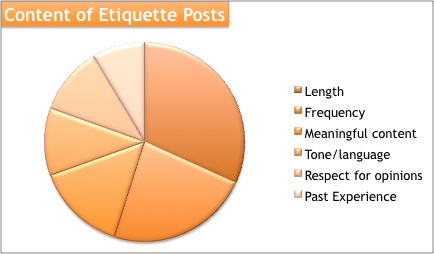Feminist Online Writing Courses
Civic Rhetoric, Community Action, and Student Success
Letizia Guglielmo
Community |
Biography |
Etiquette |
Questions |
Analysis: Discussion Board Etiquette continued
Of the thirty-eight participants, an average of 76.9 percent of participants (82.4% in section one and 71.4% in section two) offered their feedback and suggestions. Since I had mentioned length and frequency of posts in my opening message, it is not a surprise that student posts addressed those issues most often: 68.4 percent mentioned length, specifying either a set length or preferring no set length, and fifty percent (50%) mentioned frequency of posts in a given week, noting the dangers of overposting and suggesting that at least one reply be required. Nearly thirty-two percent (31.6%) of participants noted that posts should include meaningful content or helpful comments that move beyond, “I agree” or “I disagree,” while 23.7 percent commented equally on the tone of posts, suggesting that students avoid rude comments, and respect for all opinions. Furthermore, students suggested that their peers sign-off with their names, avoid offensive language, include the name of the peer to whom they are responding, and avoid all caps in their messages. In offering these suggestions, 18.4 percents of students made comparisons or references to past online communication experiences or past online courses. Specifically, students’ posts referenced:
- “open lines of communication”
- “goal of us all becoming better writers”
- “be[ing] open to all ideas”
- “[. . .] stay[ing] on topic”
- “[. . .] learn[ing] by trying to help others”
Overwhemlingly, student posts addressed all of the issues that I typically include in the etiquette document and more. Most exciting was the collaborative and encouraging tone of student posts that reiterated the course focus on writing (see comment above) and encouraged both participation and civil discourse:
- “[T]he more you post the better [writer/communicator] you will be”
- “Remember, it’s not only what you say, but how you say it. Let’s aim to build each other up”
- “From reading all the bio’s [sic] we all have completely different opinions and backgrounds and can learn a lot from each other.”
Students' participation and their careful reflection evident in their posts illustrated both the success and the importantce of this act of civic participation early in the semester to create a foundation for the community.
